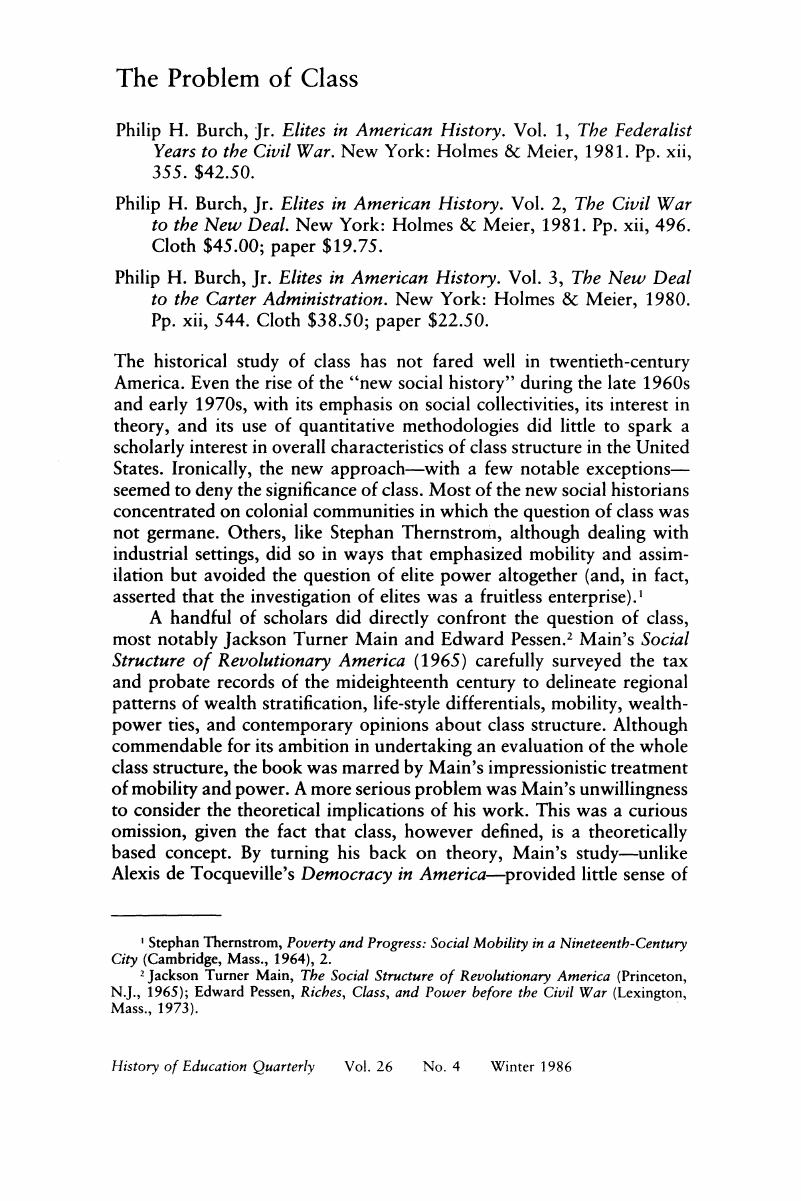No CrossRef data available.
Article contents
The Problem of Class
Published online by Cambridge University Press: 24 February 2017
Abstract

- Type
- Essay Reviews
- Information
- Copyright
- Copyright © 1986 by the History of Education Society
References
1. Thernstrom, Stephan, Poverty and Progress: Social Mobility in a Nineteenth-Century City (Cambridge, Mass., 1964), 2.CrossRefGoogle Scholar
2. Main, Jackson Turner, The Social Structure of Revolutionary America (Princeton, N.J., 1965); Pessen, Edward, Riches, Class, and Power before the Civil War (Lexington, Mass., 1973).Google Scholar
3. Digby Baltzeil, E., Puritan Boston and Quaker Philadelphia: Two Protestant Ethics and the Spirit of Class Authority and Leadership (New York, 1979); Story, Ronald, The Forging of an Aristocracy: Harvard and the Boston Upper Class, 1800–1870 (Middletown, Conn., 1980); Jaher, Frederic Cople, The Urban Establishment: Upper Strata in Boston, New York, Charleston, Chicago, and Los Angeles (Urbana, Ill., 1982). Other efforts by historians to deal with class from a national perspective are Kolko, Gabriel, Wealth and Power in America: An Analysis of Social Class and Income Distribution (New York, 1962); and Soltow, Lee, Men and Wealth in the United States, 1850–1870 (New Haven, Conn., 1975). Soltow's book is based on an intensive analysis of census records. Although not concerned with social processes, it is an invaluable analytical and descriptive guide to the regionalization and ethnology of wealth.Google Scholar
4. Johnson, Paul E., A Shopkeeper's Millennium: Society and Revivals in Rochester, New York, 1815–1837 (New York, 1978); Clyde, and Griffen, Sally, Natives and Newcomers: The Ordering of Opportunity in Mid-Nineteenth Century Poughkeepsie (Cambridge, Mass., 1978); Ryan, Mary P., Cradle of the Middle Class: The Family in Oneida County, New York, 1790–1865 (Cambridge, Eng., 1981). These are only three of a larger set of industrial communities undertaken during the 1970s. Others worthy of note are Frisch, Michael H., Town into City: Springfield, Massachusetts, and the Meaning of Community, 1840–1880 (Cambridge, Mass., 1972); Katz, Michael B., The People of Hamilton, Canada West: Family and Class in a Mid-Nineteenth-Century City (Cambridge, Mass., 1975); and Warner, Sam Bass Jr., The Private City: Philadelphia in Three Periods of Its Growth (Philadelphia, 1968). For an excellent critique of historical studies of community, see Bender, Thomas, Community and Social Change in America (New Brunswick, N.J., 1978).Google Scholar
5. The best summary of the pluralist/power elite debate is contained in William Domhoff, G. and Ballard, Hoyt B., eds., C. Wright Mills and the Power Elite (Boston, 1968).Google Scholar
6. Allmendinger, David F., Paupers and Scholars: The Transformation of Student Life in Nineteenth-Century New England (New York, 1975); Burke, Colin B., American Collegiate Populations: A Test of the Traditional View (New York, 1982).Google Scholar
7. Holmes, Oliver Wendell Sr., Elsie Venner: A Romance of Destiny (New York, 1861), 16.Google Scholar
8. Wendell, Barrett to Eliot, Charles W., 11 Apr. 1893, Charles W. Eliot Papers, Harvard University Archives.Google Scholar
9. Eliot, Charles W. to Wendell, Barrett, 15 Apr. 1893, ibid. Yale University.Google Scholar
10. Ayer, J.C., Some of the Uses and Abuses in the Management of Our Manufacturing Corporations (Lowell, Mass., 1863).Google Scholar
11. On the debate over the education of corporate managers, see Calvert, Monte A., The Mechanical Engineer in America, 1830–1910: Professional Cultures in Conflict (Baltimore, 1967).Google Scholar
12. Miller, William, “The Recruitment of the American Business Elite,” in Men in Business: Essays on the Historical Role of the Entrepreneur, ed. Miller, (Cambridge, Mass., 1962), 329–37.Google Scholar
13. Pierson, George W., The Education of American Leaders: Comparative Contributions of U.S. Colleges and Universities (New York, 1969), 94–95.Google Scholar
14. Fussell, Paul, Class: A Guide through the American Status System (New York, 1983).Google Scholar
15. Levison, Andrew quoted in ibid., 14.Google Scholar




